Does tea stain your teeth? We all know that coffee can stain your teeth, but what about tea? Well, surprisingly, tea may be even more likely than coffee to discolour your teeth because of its greater tannin content.
Tea can offer a lot of health advantages, but unfortunately, it may also stain your teeth. There are a lot of types of tea, hundreds, in fact, each with its own unique staining power.
The deeper the colour of the tea and the longer its been steeped in water, the more likely it is to stain your teeth.
If you don’t want to stop drinking tea, your alternative is to make sure you properly care for your teeth. Follow our tips on how to prevent tea stains on your teeth, so you can keep enjoying your morning cuppa.
In this article we will cover the following:
- Why does tea stain your teeth?
- How to prevent tea stains on your teeth
- How to remove tea stains from your teeth
- Tea that doesn’t stain teeth
We’ll also discuss the best teeth whitening methods so you can maintain your beautiful white smile.
Is tea bad for teeth?
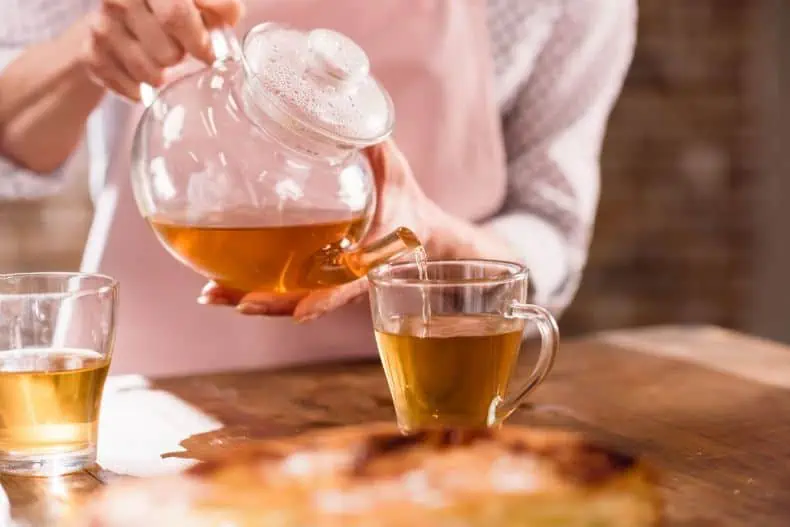
Without a morning cup of tea, many individuals would struggle to get through the day, and many people look forward to having a cuppa on their work break. However, it turns out that this popular beverage may be even worse for staining our teeth than coffee.
Not all types of tea stain your teeth, but certain teas can stain your teeth more than others. Before we get into which teas are good for you and which ones stain your teeth the worse, let’s discuss why tea stains teeth.
Why does tea stain your teeth?
This is due to the staining components theaflavins, thearubigins, and theabrownins, which may all be present in a typical cup of tea. The stronger the tea, the greater the power of these tea components to stain your teeth.
Tea has large concentrations of tannins, which may cause tooth discolouration by forming plaque on your teeth, which makes your teeth yellow.
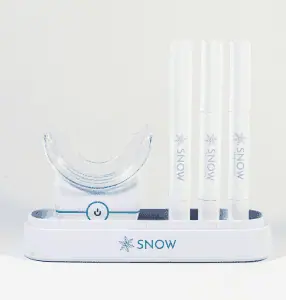
- Our #1 Teeth Whitening Kit
- Snow offers lasting results in just 9 minutes a day and satisfaction guaranteed or your money back.
- Fast Results: Noticeably whiter teeth after just one use, with full results in 21 days.
- Safe for Sensitive Teeth: Designed to be pain-free, even for those with sensitivity.
- Easy to Use: A convenient and straightforward application process.
- Celebrity Endorsed: Trusted and used by celebrities for a brighter smile.
Types of teas that stain teeth the most
Both black and fruit teas can cause discolouration of your teeth. Enamel is porous by nature, and it may absorb tannins from your tea which may result in an unsightly brown discolouration.
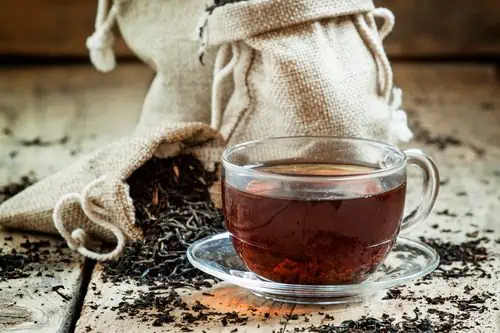
Black tea
Black tea is beneficial to your health. It contains antioxidant characteristics, and there are studies that show black tea may improve heart health, decrease blood pressure, and lower blood sugar levels.
However, with its high tannin content, black tea is known to stain teeth more than other types of tea. Our teeth naturally discolour and stain over time, but black tea may accelerate staining significantly faster.
The oxidation stage is what gives black tea its characteristic colour and flavour, and it’s what distinguishes it from green and white teas in terms of taste and appearance.
Green tea
Green tea does not stain your teeth as much as black tea. Still, when consumed often, it is a leading cause of tooth discolouration.
White tea
Black and green teas are known for leaving brown stains on teeth, despite their incredible health benefits. White tea is a wonderful alternative for tea lovers who want to experience the tea taste without the stains. White tea is lighter in colour and without the compounds that produce stains.
Don’t assume that simply because it’s light in colour means it’s lacking in flavour. White tea, like black and green tea, is made from the same plant.
Peppermint tea
Peppermint tea’s energising taste makes it a popular option, particularly during the winter when it provides a warm and inviting sensation. People may be surprised to learn that peppermint tea is unlikely to stain teeth, making it a great tea choice. It may only cause minor stains when you drink it in large quantities.
Compared to other liquids like coffee, black tea, or red wine, peppermint tea is significantly less likely to produce visible stains.
Herbal tea
Herbal tea’s ability to stain teeth is mostly determined by the kind of herbal tea consumed. Because most herbal teas are “tisanes” rather than real tea varieties, they do not discolour teeth. However, the higher the tisane’s acid and tannin content and its brew strength, the more likely it is to stain teeth.
Tea that doesn’t stain teeth
Here are some types of teas that won’t stain teeth, or will only leave slight discolouring if heavily consumed:
- White tea
- Peppermint tea
- Rooibos tea
- Yerba Mate
8 tips on how to prevent tea stains on teeth
For some people, switching to a different tea or giving up tea and coffee altogether might be difficult. Fortunately, this does not mean that you will have stained teeth for the rest of your life. While you may still have residual staining on your teeth, there are still several options for removing tea stains from your teeth.
Try some of the following tips to prevent and get rid of tea stains on your teeth:
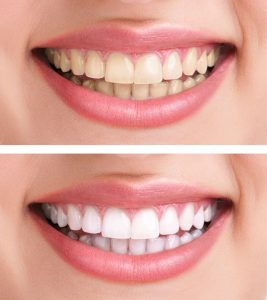
- After drinking black tea, immediately rinse your mouth with water or mouthwash. The primary purpose is to remove any remaining dark-coloured liquid that may be stuck between the teeth.
- Limit your tea intake. You will notice more serious stains if you consume black tea regularly. The easiest strategy to limit the amount of staining is to drink less black tea.
- Drink different teas. Green, white, and peppermint teas stain less than black tea.
- Brush and floss regularly. At least twice a day, once in the morning and once at night, brush and floss your teeth. Brushing and flossing after drinking a dark-coloured beverage is also a good idea.
- Increase your intake of abrasive foods. Abrasive or crunchy foods may aid in the removal of tannins. Apples, cucumbers, carrots, celery, radishes, and rice crackers are examples of abrasive foods to include in your diet.
- Make use of a straw. When drinking black tea, another alternative is to use a straw. This will prevent the tannins from coming into contact with the front of the tooth, preventing surface discolouration. Just make sure your tea isn’t too hot before drinking it from a straw!
- Toss some milk into your tea. The quantity of tannins in a dark-coloured beverage is not reduced by adding milk. However, it may reduce the likelihood of tannins sticking to your teeth because the calcium intake may help to strengthen tooth enamel.
- Consider your options for whitening. Teeth whitening strips and special toothpaste may be used at home to help remove the stains. Most dental clinics now provide in-office whitening services. They are more expensive than home treatments, but they are also more effective.
How to prevent tea stains on teeth
Rinsing your mouth with water immediately after drinking tea helps to prevent tea stains on your teeth. Brush and floss your teeth at least twice a day.
How to drink tea without staining your teeth
To drink tea without staining your teeth, you can either drink it using a straw or switch to another less staining type of tea. Rinse your mouth with water after drinking tea.
How to remove tea stains from teeth
You have a few options to remove tea stains from your teeth, depending on how severe the stains are. Consider professional teeth whitening or home remedies such as baking soda.
There are some home remedies that you may have heard about such as using lemons or banana peels, but they most likely won’t work anywhere close to as well as in-office whitening or a home whitening kit. You can also go an get a professional cleaning from your dental hygienist to attempt to remove tea stains:
Conclusion
Because of its high acidity and tannin content, tea is a major source of tooth stains, in addition to other caffeinated beverages like coffee and some fizzy drinks. Switching to a different variety of tea, such as peppermint tea, white tea, rooibos tea, or yerba mate, may help you avoid staining your teeth.
It’s not difficult to avoid stained teeth and remove existing stains. Simply switching to tooth-friendly teas, reducing tea consumption, or cleaning and brushing your teeth immediately after drinking your tea will help prevent stains from accumulating on your teeth.
If you have permanent stains on your teeth from drinking tea, see your dentist for a safe teeth whitening treatment or purchase an over-the-counter solution.
FAQ
Can you drink tea after brushing your teeth?
Brushing your teeth is good for your teeth in the long term, but it might weaken your enamel temporarily. Therefore it’s a good idea to wait thirty minutes after brushing before you drink tea.
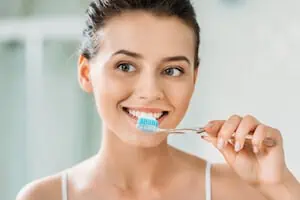
Does tea make your teeth yellow?
Black tea is known to leave yellow stains on your teeth. This is because tea contains tannins, which cause discolouration when they come into contact with the pores of your tooth enamel.
Does black tea stain teeth?
Black tea has certain health benefits, but it contains tannins, which are known to stain your teeth over time. Black tea stains more than other teas, like white tea or peppermint tea.
Does green tea stain teeth?
Green tea is less likely to discolour your teeth than black tea. However, it can often leave a dull grey stain when consumed frequently, while black tea leaves a more yellowish-brown stain.
Does white tea stain teeth?
Because white tea is lighter in colour and lacks the components that create stains, it does not stain your teeth as much as black tea. If you want to avoid stains, it might be a great alternative.
Does peppermint tea stain teeth?
Peppermint tea is unlikely to stain your teeth. It does not have the teeth-staining elements contained in black tea. Therefore, peppermint tea is a great alternative to prevent tea stains.
Does herbal tea stain teeth?
The potential of herbal tea to discolour teeth is mostly dependent on the kind of herbal tea consumed. Most herbal teas do not stain teeth since they are “tisanes” rather than true tea kinds.
Does ginger tea stain teeth?
Ginger tea does not stain your teeth; instead, it might even help to whiten your teeth. The compounds in ginger tea can also help reduce oral bacteria and benefit your overall oral health.
Does iced tea stain your teeth?
According to some studies, iced tea will stain your teeth less than hot tea since the number of staining molecules is smaller. However, try to stay away from sugar, which can harm your teeth.
Is it okay to drink tea after brushing your teeth?
Brushing your teeth is beneficial in the long term, but it might weaken your enamel temporarily. Therefore, wait thirty minutes after brushing before drinking tea or other beverages.
teacrossing.com. 5 Teas That Won’t Stain Your Teeth. Consulted 3rd June 2022.
huffpost.com. Tea Is The Biggest Culprit Behind Teeth Discolouration. Consulted 3rd June 2022.
teahow.com. Does Herbal Tea Stain Teeth? Which Ones, How to Avoid It. Consulted 3rd June 2022.
NCBI. Molecular evidences of health benefits of drinking black tea. Consulted 3rd June 2022.




